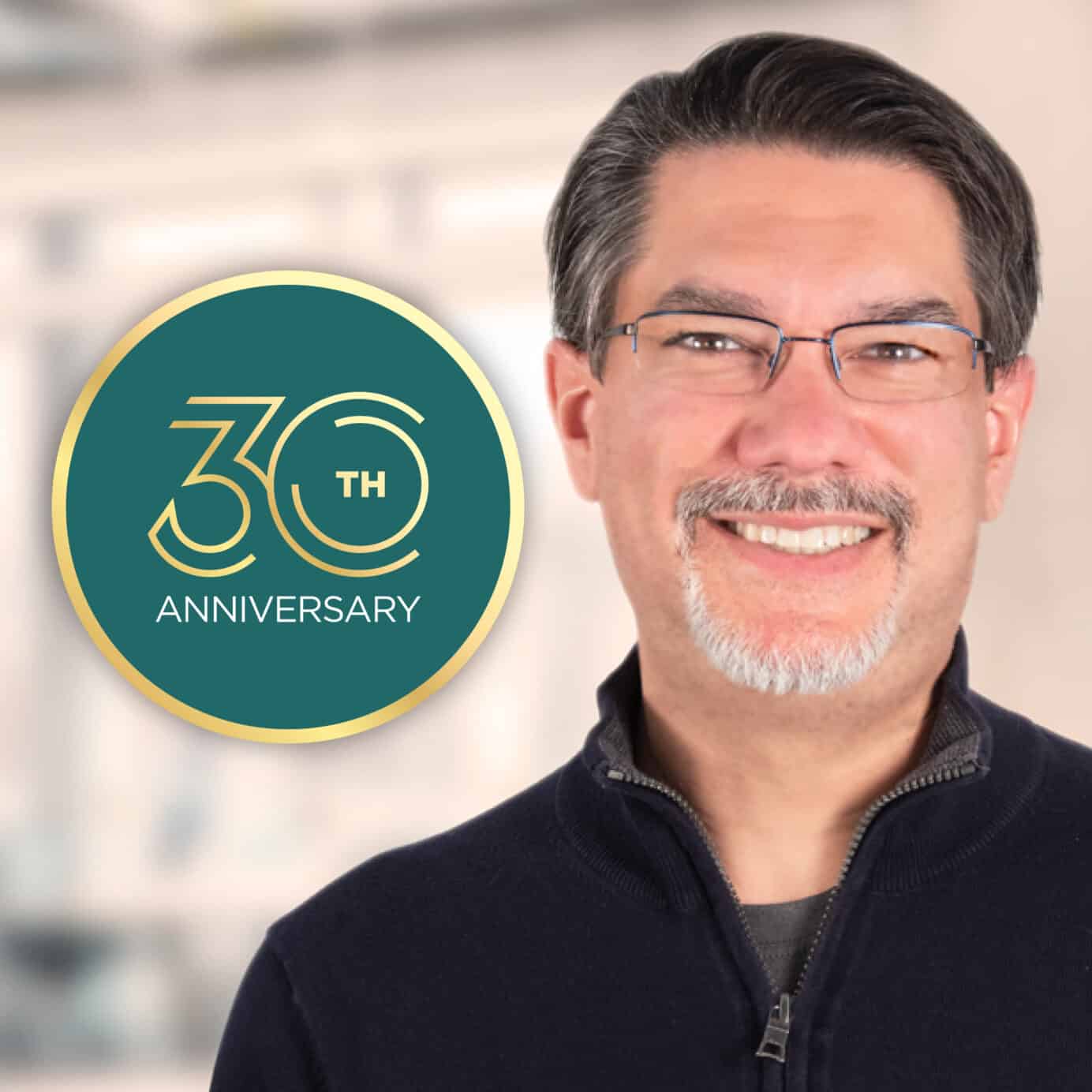Celebrating 30 years of innovation and leadership:
A conversation with Rick Yager

Lydon is excited to celebrate a monumental milestone with our esteemed partner and technology director, Rick Yager, a true trailblazer in the marketing and technology landscape. With 30 years of pioneering work under his belt, Rick has witnessed firsthand how technology has shaped the world of modern marketing.
To commemorate his incredible work-iversary, we sat down with Rick to reflect on his journey, the transformative changes he's experienced, and his vision for the future of Lydon and marketing. Pull up a chair and enjoy our engaging conversation.
LYDON: Thirty years in one industry is quite an achievement! What would you say has been the most transformative technological advancement during your time, and how has it reshaped your approach to work?
RICK: That’s an interesting question to reflect on. There have been so many incremental changes in technology over the years. We recognized many of them as significant advances in the moment; but given the benefit of hindsight, there are only a few that rise to the level of being truly singular.
When I started with Lydon just out of college in 1994, the physical nature of working on boards was quickly being phased out by computers. I was lucky to enter the professional world at that inflection point. It really set a whole new course for all of business and allowed me to transition into it with ease.
I remember setting up the company’s first AOL account and managing our first emails with clients. Now I can barely recall how we communicated before that.
Then there was the advent of the PDF. I don’t think any of us realized the impact that this simple file format would have. The PDF really signaled the beginning of a wholesale shift from physical printed documents to completely digital deliverables and workflows.
Social media has also made an enormous impact on how we communicate, not only in the business world, but culturally.
Now we are all astounded by the evolution of AI in our industry. Plenty of prognosticators out there are predicting the potential effects of AI—both good and bad—but, I think everyone will agree that it is certain to be another transformational advancement in our digital evolution.
LYDON: With technology constantly pushing boundaries, what emerging trends or innovations in marketing excite you the most, and why do you believe they’ll shape the future of the industry?
RICK: I have already mentioned AI as being a transformational technology. It certainly has the capabilities to make us significantly more efficient in our daily tasks. What really fascinates me, however, is the conversation it is opening about creativity and the human aspects of the work we do.
I really believe that AI will ultimately force us to recognize that real communication, at its core, is a human activity. Computers can transfer information, they can analyze data, they can synthesize responses from inputs—but they cannot think, feel, communicate or create like a human. Subtlety and nuance are typically lost in the output.
In our world of marketing, the human aspects of creativity and communication translate to authenticity. Authenticity translates to trust. Trust is necessary to build lasting client and customer relationships.
As technology in our world advances and takes on our daily tasks, our critical role will be to bring the humanity to the communications we create as we endeavor to tell our clients’ stories and bring their brands to life in the imagination of their customers.
LYDON: In an ever-changing landscape, how have you embraced change as a leader, and what strategies have helped you navigate uncertainty?
RICK: As they say, change is the only constant. My nature is to be steady and reliably consistent. I like routine, which poses a challenge. I have had to work hard to be accustomed to the speed at which things change in technology, in business, and in life.
Overall, I try my best to be comfortable with the fact that what is considered a benchmark today will likely be obsolete tomorrow. I do have an innate love for curiosity and anticipating what new products and experiences the future will bring. That helps me maintain balance between the comfort of stability and the uncertainty of the future.
My job of 30 years has been to make sure Lydon provides deliverables to our clients that are consistent, reliable and reproducible. Once an innovation has matured, or at least progressed beyond the tumultuous infancy stage, then I begin to dig in and work on incorporating it into our offerings.
For instance, as a rule of thumb, I don’t go all-in on the hottest software or innovation. I look to first adopters to be the guinea pigs that contend with all of the initial bugs and ultimately help innovations become workable solutions for us and our clients.
LYDON: What strategies or habits have helped you stay curious and innovative throughout your 30-year career?
RICK: That curiosity is key. I have always been a naturally curious person. I’ve always loved to learn new things, so that drive to seek out what’s “new” has never been a challenge for me.
However, as I get older, I find the speed of “new” increasing at such an incredible rate that it’s hard to keep up. That’s where having kids is really helpful. As they get interested or inspired by new things, it gives me a really great objective viewpoint. As they ask questions about the latest and greatest, it gives me that extra push to find out more and have a conversation about it.
LYDON: What mindset or skills are critical at the intersection of creativity and technology, especially for those just starting their careers today?
RICK: There was a point earlier in my career when I was all about technology—what is the greatest computer, hottest peripheral, or the coolest emerging software.
I quickly found out that those were just more tools. And those tools would also change—they would get better, they would get worse, or sometimes they would evaporate.
It is the creative aspect of this job that has sustained my passion and excitement for 30 years. You can use a multitude of programs or plugins to create a solution. But, if it’s not inspired, if it doesn’t find a new and creative way to communicate the client’s message to their customer, then it will fail every time.
I would recommend that creatives find ways to use all of the tools they have at their disposal to gain inspiration. Then iterate that inspiration to create the most targeted and relevant communications possible.
Whether you’re using a Macintosh Quadra 630 back in 1994, or an M4 MacBookPro today—the same principles of quality creative and impactful communication remain.

